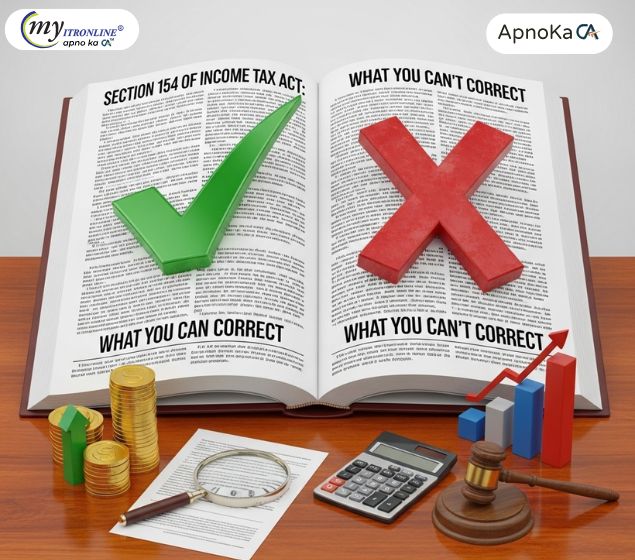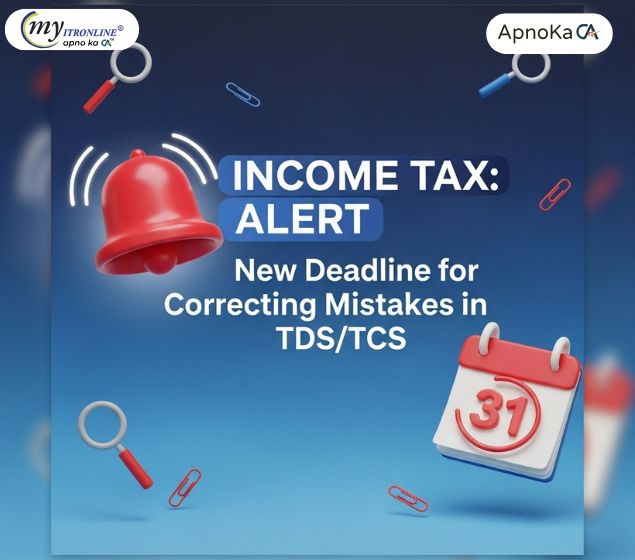# tds
12 posts in `tds` tag

Section 154 of Income Tax Act: What You Can and Can’t Correct
Section 154 of the Income Tax Act allows taxpayers to correct obvious errors in their tax assessments. This blog outlines common mistakes like TDS mismatches, incorrect tax calculations, and personal detail errors, and explains how to file a rectification request online. A must-read for salaried individuals, freelancers, and business owners.

194J vs. 44AD: Tax Scrutiny on India's Content Creators & Consultants
This blog post addresses the increasing tax notices faced by Indian content creators, influencers, and consultants due to a common mismatch: clients deducting TDS under Section 194J while they file income tax returns under Section 44AD. It breaks down the key tax provisions (194J, 44AD, 44ADA), explaining what each means for freelancers and businesses. The article clarifies that a 194J deduction doesn't automatically mandate filing under 44ADA; the crucial factor is whether the profession is listed under Section 44AA. It details potential impacts on tax burden, cash flow, and the need for increased documentation, while also offering actionable steps for creators and consultants to ensure compliance, including clarifying work nature, maintaining records, client communication, cash flow monitoring, and seeking professional tax advice.

Income Tax Alert: New Deadline for Correcting Mistakes in TDS/TCS
The Income Tax Department has given a final chance to correct mistakes in TDS/TCS returns for FY 2018–19 to FY 2023–24. The correction deadline is March 31, 2026. After this, only 2 years will be allowed for revisions, and unresolved errors may lead to tax notices.

CBDT Circular 9/2025: No More 20% TDS Trouble in Property Deals
This blog post explains CBDT Circular No. 9/2025, which clarifies that the higher 20% TDS rate under Section 206AB will not apply to property transactions covered by Section 194-IA. This brings significant relief to buyers and sellers by ensuring a consistent 1% TDS deduction on property sales over ₹50 Lakhs, simplifying compliance and streamlining real estate dealings.
.jpg)
Navigating the Crypto Tax Minefield: A Detailed Guide for India's FY 2025-26
This blog provides a comprehensive guide to the taxation of Virtual Digital Assets (VDAs) and cryptocurrencies in India for the Financial Year 2025-26. It details the prevailing rules, including the flat 30% tax on all profits, the stringent policy of no loss set-off or carry forward, and the mandatory 1% TDS on transactions. The article also covers the tax implications for gifts, airdrops, and staking, along with the mandatory ITR filing requirements, to help Indian investors and traders navigate the tax landscape and ensure full compliance.
.jpg)
Don't Miss These! India's Statutory Compliance Calendar for August 2025
This blog provides a comprehensive guide to the statutory compliance deadlines for August 2025 in India. It covers key due dates for Goods and Services Tax (GST) returns like GSTR-1 and GSTR-3B, Income Tax requirements including TDS/TCS deposits and return filings, and other important statutory payments like PF & ESI. The post is designed to help businesses and individuals track their obligations, avoid penalties, and maintain financial discipline by presenting all critical dates in a clear, easy-to-understand format.

PAN-Aadhaar Linking: CBDT Offers Major Relief on TDS Demand Notices (2025 Update)
In a major relief for Indian taxpayers, the Central Board of Direct Taxes (CBDT) has waived demands for short TDS deduction arising from payments to inoperative PAN holders. This addresses the widespread issue where deductors received tax notices for not applying the higher TDS rate mandated for unlinked PANs. This blog details the conditions of this relief as per CBDT Circular No. 9/2025, outlines the crucial deadlines like September 30, 2025, and explains the actionable steps for both deductors and deductees to benefit from this waiver and ensure future compliance.
.jpg)
Digital Assets & Tax: What's New for Indian Investors in FY 2025-26?
India's digital asset taxation is maturing. For FY 2025-26, the core 30% tax and 1% TDS on VDAs remain, but expect a wider definition of VDAs and mandatory reporting by exchanges. This blog details current rules and what enhanced compliance means for crypto and other new-age investors.
.jpg)
The Latest on Partner Remuneration: FY 2025-26 Tax Changes Explained
The FY 2025-26 brings crucial changes for partnership firms & LLPs regarding partner remuneration. This blog decodes the new, increased deduction limits under Section 40(b) and the mandatory TDS introduction via Section 194T on payments to partners. It covers who's a working partner, the role of the partnership deed, and essential compliance steps for firms.
.jpg)
Good News for Your Wallet: Easier TDS Refunds Coming Soon!
This blog post explains the upcoming changes in India's income tax law regarding TDS (Tax Deducted at Source) refunds. It highlights how the new provisions, part of the Income Tax Bill 2025, aim to make it easier for taxpayers, especially small ones, to claim their excess TDS even if they miss the original ITR filing deadline. The post outlines the benefits, such as no penalties for late filing (just for refunds) and potentially simpler forms, and informs readers about the expected effective date of April 1, 2026.
.jpg)
Breaking Relief: CBDT Eases Higher TDS/TCS Burden for Inoperative PANs (Circular No. 9/2025)
This blog post explains the important relief offered by CBDT Circular No. 9/2025, dated July 22, 2025, about higher TDS/TCS rates for transactions with inoperative PANs. It describes how deductors and collectors will not be held responsible for short deductions or collections if the deductee's or collectee's PAN is made operative within certain time frames, specifically by September 30, 2025, for past transactions and within two months from the end of the month for future ones. The summary underscores the circular's importance in tackling taxpayer complaints, easing the compliance load, and encouraging PAN-Aadhaar linkage. It urges readers to grasp the new rules and take action quickly.
.jpg)
Firms & LLPs: Prepare for New Partner Payment TDS (Section 194T)
This blog post explains the new Section 194T of the Income Tax Act, which takes effect on April 1, 2025. It requires TDS on payments such as salary, remuneration, commission, bonus, and interest made by partnership firms and LLPs to their partners. The post outlines the 10% TDS rate (20% without a PAN), the ₹20,000 annual threshold, and the timing for deduction. It also clarifies which payments are exempt, including capital withdrawal, profit share, and expense reimbursement. Additionally, the post offers a checklist for firms and partners to ensure compliance and avoid penalties.
